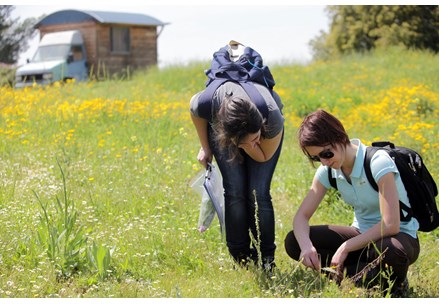
Bio-Xplore, a medicinal plant project of Israel, the Palestinian Authority, Greece, and Spain, was featured at a Hadassah-hosted workshop of the United Nations Department of Public Information (DPI) and Non-Governmental Organizations (NGOs) annual conference. Guest presenter at the workshop, entitled “Changing Lives Through International Cooperation,” was Prof. Bertold Fridlender, President of the Hadassah Academic College and Project Coordinator for Bio-Xplore, a two-year initiative, funded with a two-million euro grant from the European Union.
This international research consortium, which is now drawing to a close, has been exploring the medicinal value of natural flora in the Mediterranean Sea Basin region. Through this project, Israel’s Hadassah Academic College, the Palestinian Authority’s Biodiversity and Environmental Research Center, Greece’s Hellenic Regional Development Center, and Spain’s Leitat Technology Center, have screened thousands of plant samples for their medicinal benefits. The researchers looked at the plants’ properties as, for example, antioxidant, anti-viral, anti-bacterial, anti-cancer, and anti-fungal agents. In recording the medicinal effects, Prof. Fridlender explains, it’s important to document the season, weather, and temperature at the time so that when you grow the plants in a greenhouse, you can replicate those factors, because they do influence the plants’ effectiveness.
![]() Each of the four partners performed parallel research, so that the consortium was able to create a comprehensive data base for the Mediterranean region of the multitude of medicinal effects of bio-diverse regional plants. Using established protocols, as well as their own screening assays, the partners performed scientific research that both verified local folklore and identified plants that were previously unknown to have medicinal effects.
Each of the four partners performed parallel research, so that the consortium was able to create a comprehensive data base for the Mediterranean region of the multitude of medicinal effects of bio-diverse regional plants. Using established protocols, as well as their own screening assays, the partners performed scientific research that both verified local folklore and identified plants that were previously unknown to have medicinal effects.
The link between plants and medicine, Prof. Fridlender relates, goes back to Biblical times. In fact, he quotes the prophet, Eziekel, in describing the trees of the region: “Their fruit will be for food and their leaves for healing.”
Why would plants have these properties? Prof. Fridlender explains that plants need a way to defend themselves against natural elements and harmful external forces. He reports that 25 percent of the drugs today were derived from plants and 70 percent of the promising anti-cancer drugs come from plants of the tropical rain forests. Prof. Fridlender notes also that his Bio-Xplore project can be viewed as a first stage in the development of an anti-cancer drug.
![]() The grant from the European Commission marks the first time that a college in Israel was awarded such a significant grant. The vision for this international consortium, however, was broader than to identify medicinal plants. The goal was to employ science as a vehicle to create communication and trust among the four participating international partners and to contribute to regional economic development and well being. The representatives met through Skype and conference calls, as well as at face-to-face meetings, which enabled them to establish a strong, integrated team. Their final meeting is scheduled for this fall.
The grant from the European Commission marks the first time that a college in Israel was awarded such a significant grant. The vision for this international consortium, however, was broader than to identify medicinal plants. The goal was to employ science as a vehicle to create communication and trust among the four participating international partners and to contribute to regional economic development and well being. The representatives met through Skype and conference calls, as well as at face-to-face meetings, which enabled them to establish a strong, integrated team. Their final meeting is scheduled for this fall.
The next steps for Prof. Fridlender are to approach the Ministry of Agriculture for a grant to explore further the anti-bacteria properties of the plants they examined during this project. There is a great need to develop new antibiotics, he explains, since bacteria often become resistant to the current ones. In addition, he hopes to establish relationships with local industry to enhance the commercial potential of the consortium’s research.
